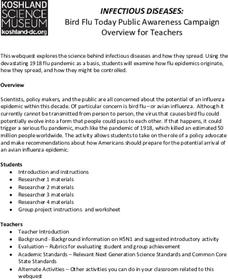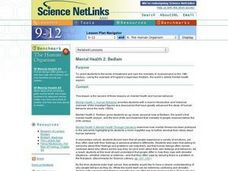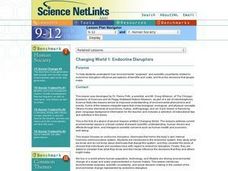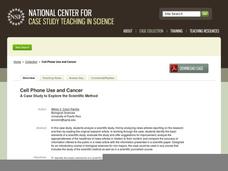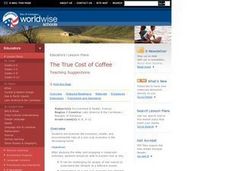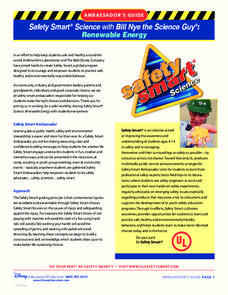Curated OER
Air Pollution in Mexico City
A fantastic instructional activity on urban air pollution problems throughout the world is here for you. Learners understand that there are many factors involved in creating pollution, that there are many health effects brought on by air...
Baylor College
How Can We Find Out What Is in Water?
Using paper chromatography, water watchers discover that several substances might be dissolved even though they aren't visible. For this case, you will prepare a mixture of three different food colorings for them to experiment with. A...
Baylor College
Pre-Assessment Activity: What Do You Know About Microbes?
In an introductory lesson, youngsters take a pre-assessment quiz, get a grasp of a gram of mass, and then estimate the mass of microorganisms that live within a human body. Using Glo Germ™, a material that allows you to simulate the...
National Academy of Sciences
Infectious Diseases: Bird Flu Today
Understanding how viruses spread has never been more important. A well-designed WebQuest lesson has young scientists research viruses, how they spread, and how they are treated. They also consider the trends in common viruses in the world.
Curated OER
What is Health?
Eighth graders identify the three aspects of health and wellness. In this health science lesson, 8th graders analyze how certain events in their life affect their health. They share their insights to class.
Curated OER
Human Papillomavirus: Investigating the Prevention, Transmission, and Treatments of a Viral Infection
Tenth graders explore the different health risks associated with human papillomavirus. In this health science lesson, 10th graders identify different ways to prevent viral and bacterial infection. They research and develop an awareness...
American Physiological Society
Why is Kettle Corn Cooked in Copper Pots?
The kitchen — it's not just for eating anymore! Specific heat is often a difficult concept to grasp, so give it context by relating it to cooking. Learners gain experience in the principles of thermal energy transfer by designing an...
Curated OER
Mental Health 2: Bedlam
Students are oriented to the kinds of treatment and care the mentally ill received prior to the 19th century-using the example of England's legendary Bedlam, the world's oldest mental health asylum.
Curated OER
In your Science! - Merging Art and Science
Ninth graders reflect on what they have learned throughout the unit. In this Science lesson, 9th graders demonstrate how working together can produce an informative useful project.
Curated OER
Exploring the USA and the World with Cartograms
Young scholars investigate cartograms in order to explore the different countries on Earth. In this world geography lesson, students use the Internet to analyze data on different cartograms. Young scholars compare data, such as...
Curated OER
Science NetLinks: Changing World 1: Endocrine Disruptors
High schoolers investigate how environmental surprises and endocrine disruptors influence perceptions of benefits and costs. The decisions of science are under these type of influences and must be thought out with a definite method.
Curated OER
The Human Organism
Students discuss human emotions and mental health. In this mental and emotional health lesson, students write a short story regarding the "think and share" choice. Students include emotion, the connection between feelings and conflict...
Curated OER
Breads Around the World
Sixth graders explore world cultures by researching dietary habits. In this bread identification lesson, 6th graders explore different regions around the world and the types of breads they produce. Students read assigned text about the...
Baylor College
Modeling an HIV Particle
Models are an important part of science; they help us see the world on a scale that works for us. In the first of five lessons on HIV, learners make a paper model of the HIV virus that is about 500,000 times larger than the actual virus....
Baylor College
Water: Post-Assessment
Very simply, the science class will discuss what they have learned during The Science of Water unit and take a multiple-choice post-assessment quiz. A few other closing activities are suggested for you to choose from, such as having...
National Center for Case Study Teaching in Science
Cell Phone Use and Cancer
The cell phone you're using is making you deaf: news at 11:00. Oftentimes, the media uses fear tactics and other techniques to increase its audience base. In an intriguing look at the difference between scientific journals and...
Baylor College
How Do We Use Water?
Send youngsters home to survey how they use water in their homes. Then bring them together to discuss which uses are essential for our health and which are not. A helpful video offers teaching tips for this lesson, and a presentation...
Curated OER
The Brain’s Inner Workings
Do you want to learn about how you learn? Help pupils become the best learners they can be by teaching them how their brain works. The resources available include videos about brain structure and a study guide full of activities that...
Kenan Fellows
The Little Stuff Can Make a Big Difference
Great things come in small packages! What better way to illustrate this point than a week-long look at nanotechnology? Earth science scholars explore water quality issues through lab activities, then research new innovations in nanotech...
Curated OER
The True Cost of Coffee
Learners examine the economic, health and environmental risks of being a one-crop country. They explain the risks of relying on one crop. They also identify the factors that resist change.
Curated OER
The East Fork Project
Learners identify possible sources of health risks, types of exposures, routes of exposure, and populations that could be affected after discussing water pollution and environmental health hazards. After discussion, students conduct a...
Polar Bears International
Taking Action!
Motivate young scientists to stand up and take action with this environmental science instructional activity. To begin, the class works in small groups brainstorming actions that support the conservation of the earth before creating and...
Disney
Renewable Energy
Bring some energy to your physical science curriculum with this engaging Bill Nye the Science Guy lesson. Based on his Renewable Energy video, students explore the concepts of potential and kinetic energy and learn how they are applied...
Curated OER
Bromine: An Important Arkansas Industry
Arkansas ranks first in the entire world in the production of bromine! Here is a lesson which guides middle schoolers through a study about the formation and history of Arkansas' bromine reserves. They also looks at the many uses of...





